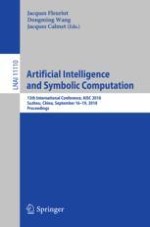2018 | OriginalPaper | Buchkapitel
Methodologies of Symbolic Computation
verfasst von : James Davenport
Erschienen in: Artificial Intelligence and Symbolic Computation
Aktivieren Sie unsere intelligente Suche, um passende Fachinhalte oder Patente zu finden.
Wählen Sie Textabschnitte aus um mit Künstlicher Intelligenz passenden Patente zu finden. powered by
Markieren Sie Textabschnitte, um KI-gestützt weitere passende Inhalte zu finden. powered by

 n, P.Q., Stehlé, D.: An LLL algorithm with quadratic complexity. SIAM J. Comput.
n, P.Q., Stehlé, D.: An LLL algorithm with quadratic complexity. SIAM J. Comput.